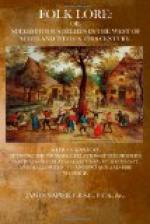“Gryte was the care and tut’ry
that was ha’en,
Baith night and day about
the bonny weeane:
The jizzen-bed, wi’
rantry leaves was sain’d,
And sic like things as the
auld grannies kend;
Jean’s paps wi’
saut and water washen clean,
Reed that her milk gat wrang,
fan it was green;
Neist the first hippen to
the green was flung,
And there at seelfu’
words, baith said and sung:
A clear brunt coal wi’
the het tangs was ta’en,
Frae out the ingle-mids fu’
clear and clean,
And throu’ the cosey-belly
letten fa’,
For fear the weeane should
be ta’en awa’.”
Before baptism the child was more liable to be influenced by the evil eye than after that ceremony had been performed, consequently before that rite had been administered the greatest precautions were taken, the baby during this time being kept as much as possible in the room in which it was born, and only when absolutely necessary, carried out of it, and then under the careful guardianship of a relative, or of the mid-wife, who was professionally skilled in all the requisites of safety. Baptism was therefore administered as early as possible after birth. Another reason for the speedy administration of this rite was that, should the baby die before being baptised, its future was not doubtful. Often on calm nights, those who had ears to hear heard the wailing of the spirits of unchristened bairns among the trees and dells. I have known of an instance in which the baby was born on a Saturday, and carried two miles to church next day, rather than risk a week’s delay. It was rare for working people to bring the minister to the house. Another superstitious notion in connection with baptism was that until that rite was performed, it was unlucky to name the child by any name. When, before the child had been christened, any one asked the name of the baby, the answer generally was, “It has not been out yet.” Let it be remembered that these notions were entertained by people who were not Romanists, but Protestants, and therefore did not profess to believe in the saving efficacy of baptism,—who could answer every question in the Shorter Catechism, and repeat the Creed, and Ten Commandments, to the satisfaction of elder and minister. But all this verbal acquaintance with dogma was powerless to eradicate, even, we may venture to say, from the minds of elder and minister, the deeply-rooted fibres of ancient superstition, which had been long crystallised in the Roman Catholic Church, and could not be easily forgot in that of the Protestant.
When a child was taken from its mother and carried outside the bedroom for the first time after its birth, it was lucky to take it up stairs, and unlucky to take it down stairs. If there were no stairs in the house, the person who carried it generally ascended three steps of a ladder or temporary erection, and this, it was supposed, would bring prosperity to the child.




